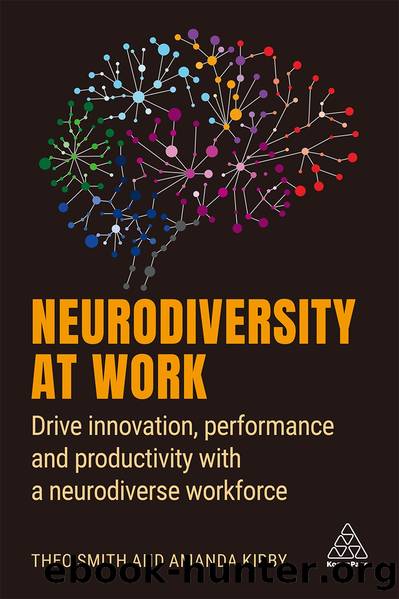Neurodiversity at Work by Kirby Amanda; Smith Theo; & Amanda Kirby

Author:Kirby, Amanda; Smith, Theo; & Amanda Kirby
Language: eng
Format: epub
Publisher: Kogan Page, Limited
Published: 2021-08-15T00:00:00+00:00
Whatâs the reality?
The reality is that there are often multiple ways to excel in a job. We need to be able to have better processes for âmappingâ the different ways one can excel in a job as this would greatly help to recruit neurodiverse candidates. A one-size dichotomous approach to hiring often excludes those with certain traits that might not even matter that much, or alternatively can be made up with other traits they actually excel in.
Another aspect of digital assessments that would help neurodiverse candidates is tools that can accurately showcase the degree of talent and ability someone has.
The first reason has to do with relativity. Remember Good Will Hunting? When Robin Williams and Stellan SkarsgÃ¥rd, the professor that won the Fieldâs medal, were in the bar and Stellan said, âThere are maybe three or four people in the world that can actually see the difference between us, that know you are so much smarter than I am? Thatâs because if some people are so much smarter in a specific area than you are, you canât tell the difference between someone who is four times as good at maths and someone who is six times as good. Both are so far out of your capacity that you donât see the difference.â
When we consider the strengths and skills of those who are neurodiverse and the fact they may demonstrate very spiky profiles, if we are measuring all candidates on a scale of 1â10 on five cognitive skills but one candidate has the potential to go off the chart on two of those skills areas, the comparison has not been a fair one and the generalist will keep winning the day.
A second important point made is about inaccuracy in our estimation of our abilities. This may be over- or underestimated and can vary by gender, culture and experience.
Digital assessment technology may reduce bias in some ways but may introduce it in others. Digital poverty is a real thing and not all jobs require digital skills. Inclusion has to be considered at the time of design and not as an afterthought. Ultimately organizations need to be more open minded to looking at candidatesâ strengths rather than their defined weaknesses.
When we consider the performance of a Formula One racing car, we donât say, âWow it uses a lot of petrol; is very expensive to repair; it doesnât even have a roof or a SATNav/multimedia system.â We say, âWow, thatâs super-lightweight, with incredible driver safety, and incredibly fast, perfectly built for what we need it to do.â
Context is everything, and if we build assessment the right way, laser focused on the key cognitive skills we require, then we give ourselves the best opportunity to build high-performing diverse teams with complementary skills and experiences.
Download
This site does not store any files on its server. We only index and link to content provided by other sites. Please contact the content providers to delete copyright contents if any and email us, we'll remove relevant links or contents immediately.
| Ethics | Etiquette |
| Fashion & Image | Health & Stress |
| Motivation & Self-Improvement | Work Life Balance |
| Workplace Culture |
Tools of Titans by Timothy Ferriss(7743)
Change Your Questions, Change Your Life by Marilee Adams(7324)
Deep Work by Cal Newport(6493)
Man-made Catastrophes and Risk Information Concealment by Dmitry Chernov & Didier Sornette(5597)
Digital Minimalism by Cal Newport;(5328)
Playing to Win_ How Strategy Really Works by A.G. Lafley & Roger L. Martin(5326)
Big Magic: Creative Living Beyond Fear by Elizabeth Gilbert(5306)
The Slight Edge by Jeff Olson(5176)
The Motivation Myth by Jeff Haden(4967)
Ego Is the Enemy by Ryan Holiday(4895)
Stone's Rules by Roger Stone(4822)
The Laws of Human Nature by Robert Greene(4728)
Tuesdays with Morrie by Mitch Albom(4357)
Rising Strong by Brene Brown(4172)
Eat That Frog! by Brian Tracy(4104)
Skin in the Game by Nassim Nicholas Taleb(3945)
The Money Culture by Michael Lewis(3796)
Bullshit Jobs by David Graeber(3793)
Skin in the Game: Hidden Asymmetries in Daily Life by Nassim Nicholas Taleb(3700)
